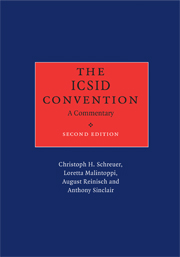Book contents
- Frontmatter
- Contents
- Foreword by Professor Sir Elihu Lauterpacht, CBE, QC
- Authors' preface to the second edition
- Table of cases
- List of abbreviations
- Text of the ICSID Convention
- Procedural calendar
- PREAMBLE
- CHAPTER I International Centre for Settlement of Investment Disputes
- Article 1 Establishment of Centre
- Article 2 Seat of Centre
- Article 3 Organization of Centre
- Article 4 Composition of Administrative Council
- Article 5 Chairman of Administrative Council
- Article 6 Functions of Administrative Council
- Article 7 Decisions of Administrative Council
- Article 8 No Remuneration for Members
- Article 9 Composition of Secretariat
- Article 10 Secretary-General and Deputy Secretary-General
- Article 11 Functions of Secretary-General
- Article 12 Panels of Conciliators and Arbitrators
- Article 13 Designation to Panels
- Article 14 Qualities of Panel Members
- Article 15 Periods of Office of Panel Members
- Article 16 Multiple Designations
- Article 17 Financing
- Article 18 Legal Personality of Centre
- Article 19 Immunities and Privileges of Centre
- Article 20 Immunity from Legal Process
- Article 21 Personal Immunities
- Article 22 Immunities of Parties and Witnesses
- Article 23 Archives and Communications
- Article 24 Tax Exemptions
- CHAPTER II Jurisdiction of the Centre
- CHAPTER III Conciliation
- CHAPTER IV Arbitration
- CHAPTER V Replacement and Disqualification of Conciliators and Arbitrators
- CHAPTER VI Cost of Proceedings
- CHAPTER VII Place of Proceedings
- CHAPTER VIII Disputes between Contracting States
- CHAPTER IX Amendment
- CHAPTER X Final Provisions
- Final Clause
- Consolidated bibliography
- Index by article
- Index by subject
Article 18 - Legal Personality of Centre
from CHAPTER I - International Centre for Settlement of Investment Disputes
Published online by Cambridge University Press: 07 September 2010
- Frontmatter
- Contents
- Foreword by Professor Sir Elihu Lauterpacht, CBE, QC
- Authors' preface to the second edition
- Table of cases
- List of abbreviations
- Text of the ICSID Convention
- Procedural calendar
- PREAMBLE
- CHAPTER I International Centre for Settlement of Investment Disputes
- Article 1 Establishment of Centre
- Article 2 Seat of Centre
- Article 3 Organization of Centre
- Article 4 Composition of Administrative Council
- Article 5 Chairman of Administrative Council
- Article 6 Functions of Administrative Council
- Article 7 Decisions of Administrative Council
- Article 8 No Remuneration for Members
- Article 9 Composition of Secretariat
- Article 10 Secretary-General and Deputy Secretary-General
- Article 11 Functions of Secretary-General
- Article 12 Panels of Conciliators and Arbitrators
- Article 13 Designation to Panels
- Article 14 Qualities of Panel Members
- Article 15 Periods of Office of Panel Members
- Article 16 Multiple Designations
- Article 17 Financing
- Article 18 Legal Personality of Centre
- Article 19 Immunities and Privileges of Centre
- Article 20 Immunity from Legal Process
- Article 21 Personal Immunities
- Article 22 Immunities of Parties and Witnesses
- Article 23 Archives and Communications
- Article 24 Tax Exemptions
- CHAPTER II Jurisdiction of the Centre
- CHAPTER III Conciliation
- CHAPTER IV Arbitration
- CHAPTER V Replacement and Disqualification of Conciliators and Arbitrators
- CHAPTER VI Cost of Proceedings
- CHAPTER VII Place of Proceedings
- CHAPTER VIII Disputes between Contracting States
- CHAPTER IX Amendment
- CHAPTER X Final Provisions
- Final Clause
- Consolidated bibliography
- Index by article
- Index by subject
Summary
Art. 18 is the first of seven Articles in the Convention's Section on Status, Immunities and Privileges. For other international institutions, the issues covered by this Section are often dealt with in separate treaties. These treaties are multilateral conventions on privileges and immunities as well as bilateral headquarters agreements. None of these treaties cover the Centre. The Centre is not a specialized agency in the sense of Art. 57 of the United Nations Charter. Therefore, the 1947 Convention on the Privileges and Immunities of the Specialized Agencies is not applicable to it. Neither is there a headquarters agreement between ICSID and the United States. Since the Centre has separate international legal personality, the treaties covering the status, immunities and privileges of the World Bank do not apply to it. It follows that Arts. 18–24 of the ICSID Convention are the only treaty provisions covering the status, immunities and privileges of the Centre.
A clause providing for legal personality was contained in all drafts to the Convention (History, Vol. I, p. 90). This clause was not uncontested and led to some debate (History, Vol. II, pp. 55, 101, 113, 246, 248/9, 312/3, 670, 697, 724). Mr. Broches explained that the clause was designed to distinguish the Centre from the World Bank (at pp. 312, 380).
- Type
- Chapter
- Information
- The ICSID ConventionA Commentary, pp. 58 - 59Publisher: Cambridge University PressPrint publication year: 2009



